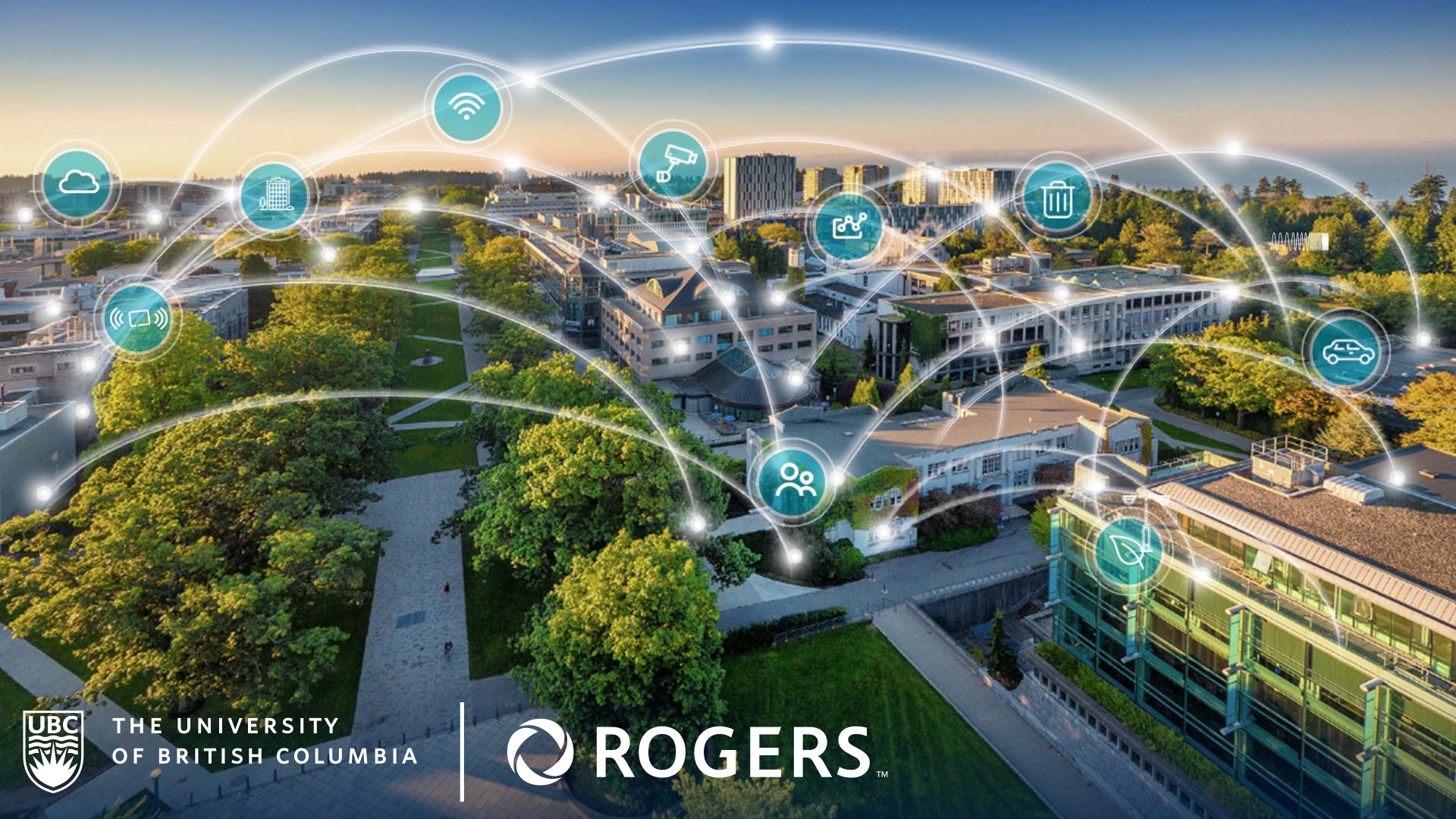
The UBC and Rogers partnership launched in 2018 to create North America’s first 5G campus network as a living lab for innovations in next-generation wireless networks.
The partnership is built on UBC research talent and capacity and leverages the university‘s experience in utilizing its campus as a living lab to emulate a real-world environment with real data.
Rogers and UBC identify and develop research projects and student engagement opportunities through an open, collaborative and evolving process. By building this program collaboratively, the partnership results in projects that benefit all stakeholders. UBC faculty and students experience new research and learning opportunities and formats, working with the latest technologies. They also benefit from an accelerated pathway to impact for research in an energizing stakeholder-engaged environment. Rogers and other partners seek to develop commercial applications based on the research, with social, health, and environmental impacts a top priority throughout the relationship.
This open and collaborative nature of the partnership has generated a number of exciting projects that address both the fundamentals of 5G and the development of new 5G applications, in a new model for university-industry partnerships.
The partnership was renewed in 2021 and currently runs until 2025.
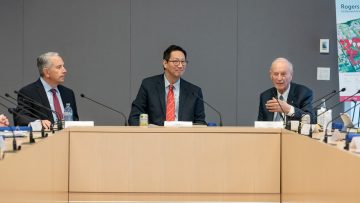
Pictured (L-R): Tony Staffieri, President and CEO, Rogers Communications; Prof. Santa J. Ono, 15th President of UBC from 2016-2022; Phil Lind, Vice Chair, Rogers Communications Board of Directors
“Our continued partnership allows us to pursue research discoveries and develop new applications of 5G to address societal and economic challenges. Together, we are investigating how 5G technology can help to shape and rebuild our world in ways that can have far-reaching positive impacts at UBC and beyond.” Professor Santa J. Ono, 15th President of UBC from 2016-22
Projects span research developing 5G fundamentals and applied research addressing the use of 5G in high impact areas across social, health, and environmental domains.
The 2021 renewal of the partnership until 2025 enables researchers at UBC’s Vancouver and Okanagan campuses and Rogers to develop, explore, and test new made-in-Canada 5G capabilities in areas such as wildfire management, human teleoperations, and emergency response that will help save lives and support the province.
“5G will change the way we live and work and our partnership with UBC is critical in building a strong Canadian ecosystem for this next-generation technology.”
Neel Dayal, Director of Innovation and Partnerships at Rogers Communications.
Research Highlights
Research Projects
Human Health

Remote Human Teleoperation over 5G
Lead: Tim Salcudean, Electrical and Computer Engineering.
- This tele-ultrasound system integrates mixed reality (MR), haptics, control theory, and 5G to expand telemedicine to reach patients in remote and rural communities
Timely and Extended Monitoring in Emergencies and Disasters
Lead: Kendall Ho, Emergency Medicine
- This clinically relevant, cost-effective, and scalable medical platform uses 5G slicing and low latency to address large-scale emergency situations.
Environmental Health

5G Framework for Natural Asset Management
Lead: Lorien Nesbitt, Forestry
- A range of sensors are collecting live data on green spaces and natural assets at UBC such as trees, soil, and other vegetation. Live data collected on the movement and behaviour of people enjoying these assets are linked to the asset data and relevant building and transportation data, to inform decision-making and future green space design.
Earthquake and Tsunami Early-Warning Systems
Lead: Jose Marti, Electrical and Computer Engineering
- The higher vibration sensor density and the low latency of 5G are exploited in this project to enable neighbourhood-level early warnings of earthquakes and tsunamis Strategic actions can then be taken before the most powerful wave hits, such as shutting off power to prevent fires from gas leaks. Current systems only enable city-wide warnings.
Intelligent Transportation Data Platform and Environmental Sensing for Sustainable Cities
Lead: Naomi Zimmerman, Mechanical Engineering
- This project is developing a system to relate vehicular traffic on the UBC campus to air quality, with the sensed data communicated via the 5G testbed. It supports UBC’s efforts to achieve its 2050 greenhouse gas emission reduction goals, while creating another 5G application that could benefit us all.
Wildfire Prevention and Smart Forests
Lead: Mathieu Bourbonnais, Earth, Environmental and Geographic Sciences, UBC-Okanagan
- This work is building community and ecological fire resilience using real-time monitoring of forest conditions through 5G and next-generation fuels. It will assist in fire and landscape management, fire ecology, and climate sciences.
Wildfire Propagation Monitoring, Prediction, and Response
Lead: Jose Marti, Electrical and Computer Engineering.
- Wildfires losses are expected to increase by 50% globally by 2100. Working with Rogers and BC Wildfires Service, this project will deploy a network of sensors based on 5G technologies that will inform a real-time wildfire control console of how multiple fires are predicted to advance. Responders will be able to test the effect of their planned responses on the fire's progression to best preserve affected communities.
Smart Futures
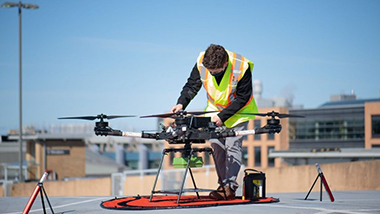
5G-enabled Smart Buildings for Energy and Space Management
Lead: Bhushan Gopaluni, ChemBio Engineering
- This project uses machine-learning tools and 5G to develop a data-driven energy management system for UBC buildings. The researchers are also designing machine learning-based algorithms that can generate live occupancy maps for campus buildings and allocate space accordingly.
Lead: Walter Merida, Mechanical Engineering
- In April 2021, UBC researchers conducted Canada’s first drone flight over a 5G network, without relying on traditional radio frequencies or a ground operator. Potential applications include delivering medical supplies to remote locations, natural disaster monitoring, and critical infrastructure inspection, all piloted from a remote command centre. Building on this work and using drones provided by InDro Robotics running on hydrogen fuel provided by Honeywell, UBC researchers from MéridaLabs along with Canada Post and UBC Campus Mail plan to test the feasibility of drone mail delivery at UBC.
Lead: Ilija Miskovic, Mining Engineering
- Digital mining technology that makes the operations of mines safer and improves sustainability through autonomous trucks and predictive truck maintenance, using the first 5G testbed for intelligent cyber-physical systems in mining in North America.
Improving Traffic Flow and Safety
Lead: Dave Michaelson, Electrical and Computer Engineering
- This project lays the groundwork for an intelligent transportation system that seeks to improve road safety, reduce traffic congestion, and enhance commercial vehicle operations and efficiency. The high data rate of 5G makes it possible to communicate vehicle-to-vehicle, vehicle to intersection, and vehicle-to-network traffic information to a multi-access edge access computer where instant decisions such as controlling traffic lights to let an ambulance through can be made by algorithms.
Core Technologies

Immersive AR/VR Video
Lead: Robert Xiao, Computer Science
- This project reduces bandwidth consumption in augmented reality (AR) and virtual reality (VR) by limiting video data transmission over 5G to the user’s point of view. A novel video compression scheme and locating the AR/VR software on the multi-edge computer reduces latency and delivers an immersive AR/VR experience with no jarring lag.
Interference Mitigation in 5G Networks
Lead: Lele Wang, Electrical and Computer Engineering
- 5G enables order-of-magnitude increases in connectivity, capacity, and speed. However, as the number of wireless devices explodes, they communicate over the same time and spectrum, causing interference. This project seeks to mitigate interference by simultaneously decoding both sender and interfering signals, and developing appropriate coding schemes that minimize interference.
Network Parameter Optimization and User Mobility Pattern Forecasting
Lead: Vincent Wong, Electrical and Computer Engineering
- Since 5G networks will handle a massive number of different types of communications and need to meet minimum quality-of-service requirements, optimizing spectral resource allocation and power budget become crucial. Network parameters such as transmission power levels and antenna tilts are usually handled manually, based on long-term traffic patterns. In order to reduce this cost and imporve efficiency of these adjustments, this project uses machine learning to adaptively adjust network parameters in real time. It also models user patterns to predict future network traffic and improve the parameter adjustments.
Network Slicing Testbed
Lead: Vincent Wong, Electrical and Computer Engineering.
- A machine-learning based technique for “network slicing.” To fully realize the potential of 5G for specific applications, a slice must be taken off the network and optimized using machine learning. The algorithm improves as the process repeats, resulting in higher data throughput at reduced delay.
Pricing and Resource Allocation in Edge Computing
Lead: Vijay Bhargava, Electrical and Computer Engineering
- Mobile edge computing (MEC) is used in 5G to bring storage, computing, control, and networking functions closer to end-users, things, and sensors, providing low latency and reliable applications. This project explores a platform for exploiting the marketplace potential of MEC, where network operators such as Rogers can provide a platform for exchange of resources among buyers requiring edge resources (e.g., enterprises) and sellers with idle computational capacity (e.g., under-used servers in institutions). The proposed platform includes a front-end for receiving offers and bids, a monitoring unit for monitoring network and resources status, and a server for making decisions on dynamic pricing and resource allocation.
Opportunities exist for UBC researchers, students and external partners to benefit from the UBC Rogers 5G collaboration.
The partnership has already led to a series of 5G breakthroughs:

– 5G Smart Campus in North America.
– 5G smart city solution piloted in Canada.
– 5G applications implemented with Multi-Access Edge Computing (MEC) for Rogers in Canada that leverages the low-latency high-performance 5G use cases.
– 5G mmWave small cells deployed strategically at UBC for research activities, providing access to the mmwave technology before it is commercially licensed widely.
– Unmanned aerial vehicle (UAV) flights over a 5G network in Canada.
Get involved and become part of the next breakthrough!
For Researchers
The partnership provides an accelerated pathway to impact for UBC research in an energizing learning environment.
- Projects are identified and teams formed in facilitated thematic online workshops, leading to problem-driven, stakeholder-engaged research. Researchers benefit from new collaborations involving faculty from across the campus, graduate students, technical staff, and additional industry partners. These collaborations also facilitate future Tri-council and other funding opportunities. Funding is multiplied by Mitacs/NSERC internships.
- Entrepreneurship support is available for project-related startups.
For Students
The partnership provides students with experiential learning in the latest communications technology.
Supported by funding multiplied by Mitacs/NSERC internships, students engaged in this research learn to communicate across disciplines in a unique training environment spanning both academia and industry.
Periodic case competitions give students an opportunity to and apply their learning to problems defined by external partners like municipalities, and a chance to showcase their talents. The competitions also generate promising solutions to pressing societal problems and help build partnerships with industry. In the context of the partnership, students can address highly relevant real-world problems that directly affect them—like Vancouver traffic congestion—using 5G technology that will soon become part of everyday life.
Entrepreneurship support is available for project-related startups, as are several new scholarships offered by Rogers.
For Industry and Other Partners
Small and medium-sized enterprises (SMEs) and other organizations are welcome additions to the partnership, and are key partners in knowledge translation.
The partnership creates opportunities to access UBC research expertise in addressing critical problems faced by SMEs, healthcare organizations, municipalities, and similar organizations. These partnerships take shape through an Innovation Discovery Partnerships model that informs all aspects of the collaboration, from project design through to implementation and the translation of research outputs to generate impact.
Partnership examples include urban transportation challenges, smart building systems, emergency preparedness, and many others.
Contact
Raymond Chau
Program Manager,
UBC-Rogers Partnership
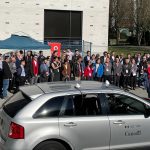
Smart Transportation Research Intersection Opens at UBC
March 31, 2023
On March 28, 2023, over 130 provincial and municipal transportation engineers and suppliers attended the opening of a new Research Intersection at UBC enabled by the UBC-Rogers Partnership.

Jade Salazaar of UBC-Rogers Partnership Named Peak Emerging Tech Leader
March 1, 2023
Rogers Innovation & Partnerships Lead Jade Salazaar, who is based in ICICS and helps manage the UBC-Rogers Partnership, has been named an Emerging Leader in the Tech category by The Peak.
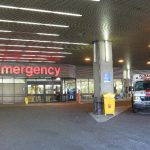
Addressing the Healthcare Crisis at the Leading Edge
January 31, 2023
Dr. Kendall Ho, Digital Emergency Medicine lead in UBC’s Faculty of Medicine and a practicing emergency department physician at Vancouver General Hospital, is leading a multidisciplinary effort supported by the UBC-Rogers partnership to address the healthcare crisis in the emergency department with new patient monitoring technologies.

$2.85M Federal Funding to Study the Climate Impact of Travel Behaviour Changes Leverages UBC-Rogers Partnership Research
November 24, 2022
Professor Mahmudur Fatmi, a Civil Engineering professor at UBC-Okanagan (UBC-O) with a focus on transportation, is the PI on a recently awarded $2.85M federal grant from Environment and Climate Change Canada for “Integrated Development of Transport Data, Model and Community Outreach Tool for Urban and Rural Regions."
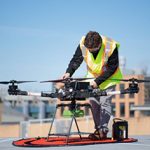
UBC Campus Models Cities for Drone Operation over 5G
November 15, 2022
The “Campus as a Living 5G Lab” created by the UBC-Rogers Partnership is being used to research the viability of employing drones in cities—which UBC models—to safely deliver packages like prescription drugs.

Prof. Dave Michelson to Teach 5G Postgraduate Course at Harbin Institute of Technology
November 4, 2022
Professor Dave Michelson, who is an active researcher in the UBC-Rogers Partnership on 5G R&D, has been invited to share his expertise by teaching the postgraduate course “Propagation and Channel Modeling in 5G Communication System Design” atthe Harbin Institute of Technology (HIT) in China.
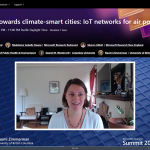
UBC-Rogers Partnership Climate Project at Microsoft Research Summit
October 26, 2022
Dr Naomi Zimmerman of Mechanical Engineering is the lead on the “Intelligent Transportation Data Platform and Environmental Sensing for Sustainable Cities” research project supported by the UBC-Rogers Partnership. She recently discussed her work at the Microsoft Research Summit, “Towards Climate-Smart Cities: IoT Networks for Air Pollution Sensing.”

UBC Team Led by ICICS Member Robert Xiao Wins World’s Top Cybersecurity Competition
October 7, 2022
A student team from Computer Science led by Professor and ICICS member Robert Xiao joined forces with crews from Carnegie Mellon University and the startup Theori.io to win DEF CON 2022, the world’s top cybersecurity competition.
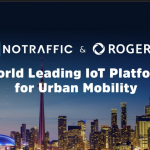
NoTraffic Collaborating with Rogers to Improve Traffic Flow in Canadian Cities
September 16, 2022
NoTraffic is teaming up with Rogers Communications to provide a 5G-based smart transportation platform to Canadian traffic agencies. The collaboration builds on the UBC-Rogers 5G Partnership.

ECE Professor David Michelson to Chair Working Group Spanning International Telecommunications Organizations
August 26, 2022
With wireless technologies become increasingly complex and urgent demand for wireless spectrum, ITU and URSI are looking to make more researchers and research consortia aware of these questions and encourage them to work together to contribute research results.

Vincent Wong and Team Secure DND IDEaS Funding for 5G Research
July 19, 2022
A team led by ICICS member and Electrical and Computer Engineering (ECE) professor Vincent Wong has won a 3 year, $1.5M award for a project titled “Toward Situational-aware and Adaptive 5G Networks for Defence and Security: A Machine Learning Approach”. Industry collaborators include Rogers Communications, Google Cloud, and General Dynamics Land Systems Canada.
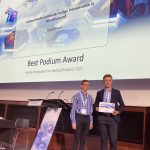
UBC-Rogers Collaborative Research Project on Tele-Ultrasound Wins Prestigious Best Paper Award
July 5, 2022
Electrical and Computer Engineering PhD candidate David Black and his supervisor Professor Tim Salcudean have won the Best Paper Award at the 14th Hamlyn Symposium on Medical Robotics held June 26-29, 2022 at the Royal Geographical Society. Their paper, “A Mixed Reality System for Human Teleoperation in Tele-Ultrasound,” emerged from collaborative researchs enabled by the UBC-Rogers partnership on 5G research and development.

Graduate Student Supported by UBC-Rogers Earthquake Early Warning Project Wins Thesis Competition
June 15, 2022
Ivelina Daiss feels privileged to work with Professor Jose Marti on the Earthquake Early Warning for the Smart City project supported by the UBC-Rogers partnership.

Best Paper Award for UBC-Rogers Partnership Project on Cellular Traffic Prediction
June 7, 2022
The UBC-Rogers partnership on 5G wireless technologies research and development has generated an award-winning paper at a highly competitive international communications conference.
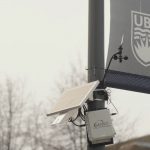
How the Rogers-UBC Partnership is Building Smarter Transportation and Healthier Cities
June 8, 2022
Rogers and its research partners are working on several projects related to intelligent transportation, leveraging UBC’s AURORA connected vehicle testbed.
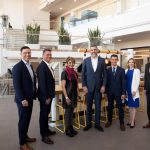
ICICS Director on Advisory Board of Proposed Rogers THINKLab
April 28, 2022
As Relationship Manager of the UBC-Rogers partnership on 5G research, ICICS Director Robert Rohling will contribute his knowledge of matching academic and industry needs in his role on the Advisory Council.
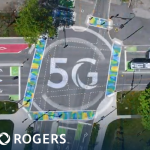
Media Coverage: UBC-Rogers Partnership Projects Highlighted in Business in Vancouver
April 7, 2022
An article in Business in Vancouver includes a report on president and CEO of Rogers Communications, Tony Staffieri’s, recent visit to UBC’s Vancouver campus.

Raymond Chau Appointed Program Manager of UBC-Rogers Partnership
Jan 11, 2022
Raymond Chau has taken on the newly created position of Program Manager, UBC-Rogers 5G Partnership.

Leveraging 5G and Student Brain Power: the UBC-Rogers 5G Smart Transportation Virtual Case Competition
Dec 10, 2021
UBC-Rogers virtual competition challenged student teams to find solutions to Vancouver traffic congestion using 5G technology.

Rogers and UBC Renew 5G Research Partnership through 2025
Nov 18, 2021
Four-year $4.8 million partnership will focus on new 5G research projects in areas like wildfire management that will help the province respond to new environmental challenges.

Rogers and UBC Unleash the Power of 5G
July 16, 2021
With enough residents to represent a small city, and with unique management of its utilities on its Point Grey campus, UBC is the ideal location for conducting 5G research in a real-world setting.
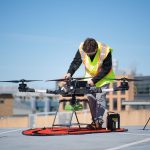
Drone Test Flight Shows Potential of 5G Networks to Support Essential Services and Accelerate Innovation
April 15, 2021
Canada’s first unmanned aerial vehicle (UAV) flights over a 5G network took place at UBC last week, showcasing some of the future potential applications of 5G-enabled autonomous flight.

Creating a Smarter City from Home
April 22, 2020
UBC students participated in challenge to imagine how 5G and other technologies could be used to address real-world municipal problems in Kelowna.
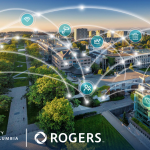
Rogers Lights Up First 5G Smart Campus in Canada at UBC
November 5, 2019
Rogers and UBC turn on country’s first 5G-powered smart campus as part of strategic partnership to advance 5G research in Canada.

Rogers 5G Edge Codeathon
Oct 29, 2019
UBC and Rogers Communications have partnered to set up the first 5G smart campus in Canada.

Rogers and UBC ink multi-year agreement to build 5G Hub in Vancouver
September 20, 2018
Rogers and UBC announce three year, multi-million dollar partnership to build a real-world 5G Hub on the UBC campus that will be a testbed and blueprint for 5G innovation in Canada.
Contact us to learn more about the partnership, and how to get involved.
UBC researchers:
- upcoming project definition workshops
- mechanics of the partnership
- leveraging Mitacs and NSERC funding
UBC students:
- experiential learning opportunities
- internships and scholarships
Industry, municipalities, healthcare and other organizations
- partnership opportunities
Raymond Chau
Program Manager, UBC-Rogers Partnership
